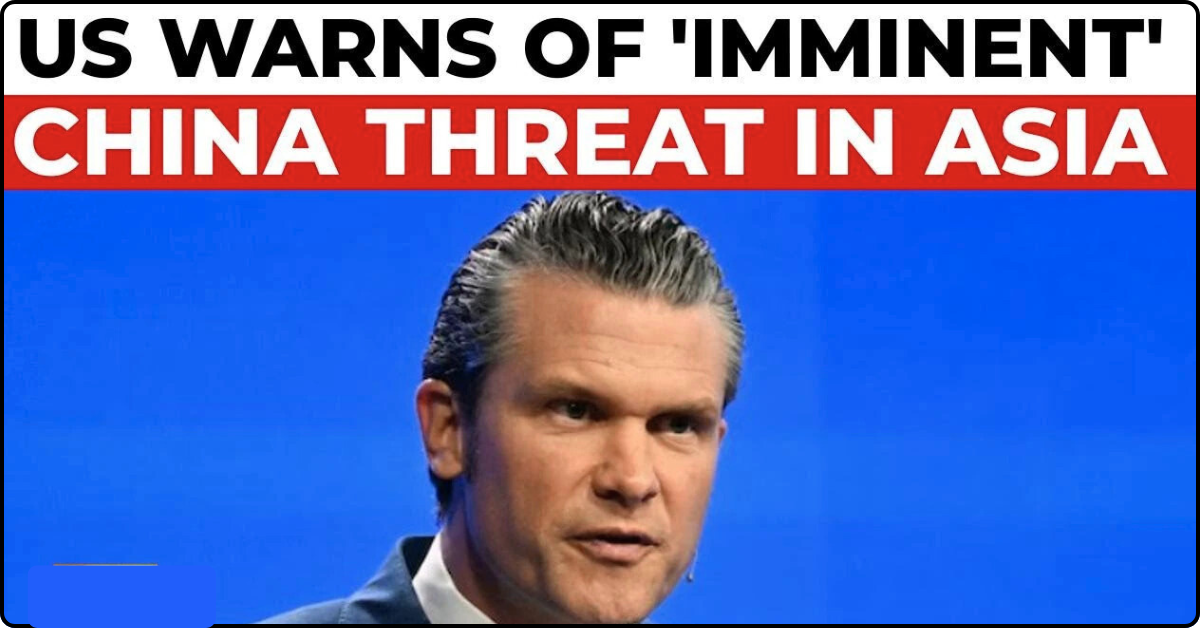In a powerful address, US Defence Secretary outlines 5 bold moves warning China’s military and urging Indo-Pacific allies to unite for lasting peace and stability in Asia.
US Defence Secretary Warns China Military: Strengthening Asian Alliances for Peace and Stability
In a bold and clear message during the Shangri-La Dialogue in Singapore, US Defence Secretary Pete Hegseth warned China’s military against aggressive expansion and called for unity among Asian allies. The message was not only a caution against militarization but also a rallying cry for cooperation, peace, and stability across the Indo-Pacific region.
In a powerful and strategic address at the 2025 Shangri-La Dialogue, US Defence Secretary Pete Hegseth outlined 5 bold moves to counter the rising threat from China’s military and secure the Indo-Pacific region.
The rising military activities of China, especially in the South China Sea and near Taiwan, have drawn international concern. Hegseth’s speech was both assertive and hopeful, highlighting the United States’ unwavering commitment to safeguarding peace and respecting international law.
A United Front for Indo-Pacific Peace
The central theme of the summit was collective security, and Hegseth emphasized the need for Asian democracies to strengthen their defence strategies. “We do not seek conflict,” he said, “but we will not hesitate to stand with our allies.” His remarks follow a growing series of tensions involving Taiwan and disputed maritime zones.
By urging nations to increase defence investments up to 5% of GDP, Hegseth presented a vision of strength through unity. He affirmed that the US is committed to supporting its Indo-Pacific allies, including Japan, South Korea, the Philippines, and Australia.
China’s Military Ambitions and the Global Response
The US Defence Secretary’s warning came amid growing evidence of China’s military preparations. According to intelligence briefings shared during the summit, President Xi Jinping has reportedly instructed the People’s Liberation Army (PLA) to be ready for a potential Taiwan invasion by 2027.
In response, the US defence strategy is shifting toward proactive deterrence, placing greater emphasis on readiness, joint exercises, and high-tech partnerships such as AUKUS (Australia, United Kingdom, United States).
Despite the warning tone, Hegseth maintained a hopeful vision: “This is not a time for fear, but for resolve. Peace is maintained by strength and partnerships.”
Australia and the Indo-Pacific Support
Australian Defence Minister Richard Marles welcomed the US stance, praising the clarity and leadership demonstrated by Secretary Hegseth. “This is a signal to the region,” Marles said, “that democracies will not be intimidated.”
Australia is increasing its own defence spending and reaffirmed its role as a key ally in preserving the Indo-Pacific’s freedom of navigation and sovereignty. The AUKUS alliance has already begun joint military initiatives, including the sharing of nuclear submarine technology and artificial intelligence advancements.
US Defence Secretary Warns China Military – But Seeks Peace
While the headline may focus on the warning, the underlying message from the US Defence Secretary warns China military expansion military address was unmistakably optimistic. The United States does not aim to escalate tensions but instead hopes to prevent them through deterrence and cooperation.
“We want to work with China, not against it,” said Hegseth. “But that work must be based on mutual respect and the rules of international law.”
Strategic Importance of Taiwan
The Taiwan Strait remains one of the most sensitive flashpoints in global geopolitics. China views Taiwan as a breakaway province, while the US and many other nations support Taiwan’s right to self-governance.
Hegseth’s speech made clear that US Defence Secretary warns China military expansion toward Taiwan would be met with serious international consequences. However, the US still emphasizes diplomacy first and foremost.
By strengthening Taiwan’s defensive capabilities and conducting multilateral naval drills, the US is ensuring that deterrence remains the cornerstone of peace in the region.
China’s Reaction and Diplomatic Crossfire
In response to the US Defence Secretary warns China military remarks, Chinese officials accused Washington of being the “primary destabilizing force” in the Indo-Pacific. They warned against the formation of NATO-like alliances in the region.
Beijing’s spokesperson said, “These groupings risk dragging Asia into unnecessary confrontation.” Despite the harsh words, analysts believe that China is still open to dialogue, particularly with economic interdependence between China and the US remaining strong.
Building a Peace-First Strategy in Asia
Despite growing threats, the Shangri-La Dialogue reaffirmed an important fact: peace is not only possible—it is achievable through diplomatic firmness, military readiness, and regional alliances.
Countries such as Japan, Vietnam, and the Philippines have all echoed similar concerns over China’s maritime actions. However, they have also shown a willingness to engage in dialogue.
As the US Defence Secretary warns China military expansion, he simultaneously opens the door to negotiations. His message was one of cautious optimism: be prepared for threats, but remain committed to peace.
for official news, Click here.
A Technological Edge for Peacekeeping
To counter rising threats without direct confrontation, the US is also investing heavily in advanced technologies. These include:
-
AI-powered surveillance systems
-
Hypersonic missile defence
-
Cybersecurity upgrades
-
Joint training programs with Pacific allies
The goal is to maintain a high-tech edge that serves as a deterrent rather than a provocation. Hegseth assured that these advancements are meant to protect, not provoke.
Global Unity Against Aggression
In conclusion, the 2025 Shangri-La Dialogue revealed a world on edge—but also one filled with hope. As US Defence Secretary warns China military, his words are a strategic blend of firmness and faith in diplomacy.
By urging nations to increase defence spending and participate in joint exercises, the US is not preparing for war—it is preparing to prevent war.
The key takeaway: global unity, built on trust and readiness, remains the most powerful shield against any threat to peace.
